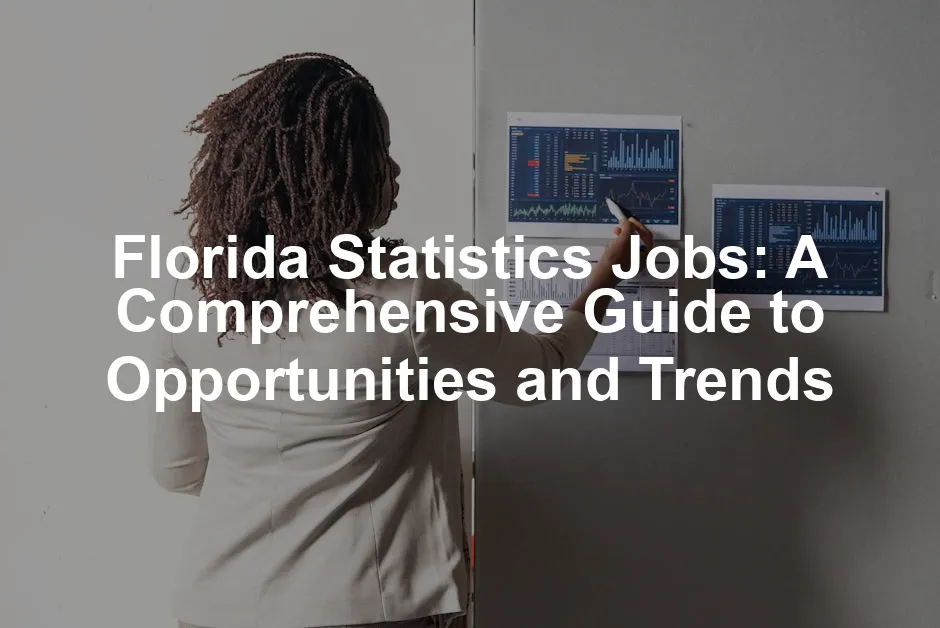Introduction
Welcome to the sunshine state, where statistics isn’t just a dry subject! Florida statistics jobs are blooming like flowers in a spring garden. In today’s data-driven world, statistics play a crucial role across various industries, from healthcare to finance and technology. Statisticians help businesses make informed decisions, predict trends, and even save lives.
The purpose of this article? We’re on a mission to give you an in-depth look at Florida’s thriving statistics job market. Whether you’re a seasoned statistician or just dipping your toes in the data pool, we’ve got you covered. You’ll find valuable insights into job opportunities, industry trends, and tips to help you land that dream gig.
So, grab your calculator and let’s crunch some numbers! We’ll explore the ins and outs of Florida statistics jobs, making sure you have everything you need to succeed. With the right information and a sprinkle of humor, we’ll help you navigate the exciting landscape of statistics employment in the Sunshine State.
The Landscape of Statistics Jobs in Florida
Current Job Market Overview
The demand for statistics professionals in Florida is skyrocketing. According to the Bureau of Labor Statistics, the job growth for statisticians and data analysts is projected to grow by 31% from 2019 to 2029. That’s much faster than the average for all occupations! This growth is fueled by the increasing reliance on data for decision-making in various sectors.
Salaries for statistics positions in Florida are just as impressive. As of 2023, the average annual salary for a statistician in Florida is around $85,000. Meanwhile, data analysts can expect to earn an average of $76,000 annually. With the cost of living being relatively affordable in many Florida cities compared to other states, these salaries make statistics jobs in Florida quite appealing.
Moreover, industries such as healthcare are actively seeking skilled professionals in statistics. For instance, roles like Data Quality Analyst at UF Health are hot commodities. Companies like Carnival Cruise Line and Maverc Technologies are also on the hunt for data-savvy individuals, with positions like Principal Revenue Management Data Science Analyst and Data Risk Analyst up for grabs.
As the job market evolves, Florida statistics jobs are becoming more diverse, with opportunities in finance, marketing, and even sports analytics. Whether you’re looking to work for a big corporation or a small startup, the options are plentiful.

If you’re eager to dive deeper into the world of statistics, consider picking up Statistical Analysis with Excel For Dummies. This book is a fantastic starting point for anyone looking to sharpen their skills and harness the power of data analysis!
In summary, if you’re considering a career in statistics, Florida is the place to be. With a booming job market, competitive salaries, and a variety of industries looking for talent, the future looks bright for statistics professionals in the Sunshine State. So, grab your sunscreen and get ready to ride the wave of opportunity!
Key Industries Hiring Statistics Professionals
Florida’s job market for statistics professionals is thriving, and several key industries are leading the charge. Let’s take a closer look at these sectors where opportunities abound for data enthusiasts.
Healthcare is one of the most significant industries hiring statistics professionals in Florida. With an increasing reliance on data to improve patient outcomes, healthcare organizations are on the lookout for skilled individuals. For instance, positions like the Data Quality Analyst at UF Health Central Florida are in high demand. This role involves ensuring that data collected is accurate and reliable, ultimately influencing patient care decisions. The healthcare sector’s commitment to data-driven practices has made it a robust source of job opportunities.
Next up is the technology sector, which is constantly evolving and hungry for statistical expertise. Companies like Carnival Cruise Line are at the forefront, seeking professionals to analyze data and enhance customer experiences. The Principal Revenue Management Data Science Analyst position at Carnival is an excellent example. Here, data professionals analyze trends and optimize pricing strategies, helping the company remain competitive in the tourism market. With tech firms embracing data analytics, this industry is a treasure trove for statistics professionals.
Speaking of tech, if you’re looking to broaden your programming skills, Python for Data Analysis: Data Wrangling with Pandas, NumPy, and IPython is an indispensable resource. This book will equip you with the tools to effectively analyze data and make informed decisions!
Finance is another major player in the Florida statistics job landscape. Financial institutions are increasingly dependent on data to assess risks and make informed decisions. For instance, the role of Data Risk Analyst at Maverc Technologies highlights how finance relies on statistical analysis to mitigate risks. Professionals in this field analyze data to predict potential losses and develop strategies to safeguard investments. The finance sector offers a wealth of opportunities for those with a statistical background.

In summary, Florida’s statistics job market is flourishing across various industries. From healthcare and technology to finance, there’s a growing demand for data-savvy professionals. Whether you’re crunching numbers to improve patient care, enhance customer experiences, or assess financial risks, the opportunities are as bright as the Florida sunshine!
Orlando
Orlando is not just about theme parks and sunshine; it’s also a hotspot for statistics jobs! This vibrant city offers opportunities for both fresh graduates and seasoned pros alike. With the growing demand for data-driven insights, Orlando has become a prime location for various roles.
One standout position is the Clinical Data Analyst at AdventHealth. This role involves analyzing clinical data to improve patient care and operational efficiency. Perfect for those who love merging healthcare with statistics! AdventHealth values innovative thinkers who can turn numbers into actionable insights.
Another exciting opportunity is for Business Analysts at local firms. These positions require professionals to analyze business needs and translate them into data-driven solutions. Companies are on the lookout for individuals who can help them navigate the complexities of the market, ensuring they stay ahead of the competition.
And if you’re seeking to empower your analytical skills, make sure to check out R for Data Science: Import, Tidy, Transform, Visualize, and Model Data. This book is a great way to get started with R and harness its power for data analysis!
Orlando’s job market is buzzing with potential. Whether you’re just starting out or looking to advance your career, there’s something for everyone. The blend of entertainment and professional growth makes this city an ideal place for statistics enthusiasts. So, if you fancy a sunny workplace with plenty of stats, Orlando is where you want to be!

Other Notable Locations
Florida has more to offer than just Orlando when it comes to statistics jobs. Other cities like Jacksonville, Sarasota, and Gainesville are also brimming with opportunities for data professionals.
In Jacksonville, the Senior Biostatistician at Mayo Clinic is a prominent role. This position focuses on analyzing complex healthcare data to support clinical trials and research. With Mayo Clinic’s stellar reputation, this job is a golden ticket for those passionate about biostatistics.
Moving south to Sarasota, the Associate Statistical Reporting Analyst at FCCI Insurance Group positions itself as another exciting opportunity. This role involves preparing and analyzing insurance data, making it vital for risk assessment and decision-making. It’s a perfect match for detail-oriented analysts who love working with numbers!
In Tampa, you can find the Data Quality Analyst at Mindlance. This role focuses on ensuring the integrity and accuracy of data within organizations. It’s a critical position as businesses rely on accurate data for strategic planning.
Don’t forget to enhance your skills with The Data Warehouse Toolkit: The Definitive Guide to Dimensional Modeling. This resource will help you understand the ins and outs of data warehousing and dimensional modeling!

With diverse roles available across these cities, Florida’s statistics job market is thriving. Each city offers unique opportunities, catering to different interests and skill sets. So, whether you’re drawn to healthcare, finance, or insurance, Florida has a spot for you in the statistics field!
Soft Skills
When it comes to statistics, technical prowess is just the tip of the iceberg. Soft skills are the secret sauce that makes a statistician truly stand out. Let’s explore two essential soft skills every statistician in Florida should possess: communication and problem-solving skills.
First off, communication skills are paramount. Statisticians often work with complex data sets, and it’s their job to translate that complexity into understandable insights. Imagine being at a dinner party and trying to explain the intricacies of a regression analysis to your Aunt Edna. You’ll need to break it down without losing her interest—or your own sanity! It’s not just about numbers; it’s about storytelling. Good statisticians can take a mountain of data and present it in a way that even non-technical folks can grasp. This skill is vital, especially in collaborative environments like healthcare or finance, where decisions based on data can significantly impact lives and investments.
Then there’s problem-solving. Statisticians are like modern-day detectives, equipped with data instead of magnifying glasses. They face challenges daily, whether it’s identifying trends in customer behavior or figuring out why a clinical trial isn’t yielding expected results. The ability to approach these challenges with a critical mind is crucial. It involves not just crunching numbers but thinking creatively to find solutions. It’s about connecting dots that aren’t immediately visible and asking the right questions. A statistician who can tackle problems head-on with innovative strategies is a real asset to any team.

And speaking of problem-solving, enhancing your skills can be made easier with Statistics for Dummies. This book breaks down the fundamentals of statistics into digestible bits, making it a must-read for any aspiring statistician!
In summary, while technical skills might get you in the door, it’s the soft skills that will help you flourish in your statistics career in Florida. Communication and problem-solving abilities are essential for translating complex ideas into actionable insights and tackling daily challenges creatively. So, polish those skills, and you might just become the statistician everyone wants on their team!
Preparing for Interviews
Landing an interview in the statistics field? Congratulations! Now, let’s prepare you to shine like a data superstar. Here are some tips that will help you tackle common interview questions and highlight your portfolio work.
First, let’s chat about common interview questions. Recruiters love to know if you can handle real-world scenarios. Expect questions like:
- Can you explain a complex statistical concept to someone without a statistics background? This tests your communication skills and ability to simplify complex ideas.
- Describe a challenging data project you’ve worked on. Here, interviewers want to see your problem-solving skills in action. Make sure to detail your approach, the tools you used, and the outcome.
- How do you ensure the quality and integrity of your data? They’re looking for your understanding of data validation and cleaning processes.
- What statistical software are you proficient in? Familiarity with tools like R, Python, or SAS can be a game-changer. Be ready to share specific projects where you utilized these tools.
- How do you approach interpreting data results? This is about your analytical thinking. Share how you draw conclusions and make recommendations based on your findings.
Next up, let’s not forget about showcasing your portfolio. Having a well-organized portfolio is as crucial as wearing matching socks to an interview (trust me, it matters). Your portfolio should highlight your best data projects. Include:
- Project Descriptions: Briefly explain each project, your role, and the impact it had. Did you help a company save money or improve efficiency? Share those stats!
- Visuals: Graphs, charts, and dashboards can make your projects pop. Visual representation of data can speak volumes about your ability to convey insights.
- Diversity in Projects: Show a range of work. Include projects from different sectors like healthcare, finance, or marketing. This demonstrates your versatility.
- Link to Code Repositories: If applicable, provide links to your GitHub or other coding platforms. Employers love to see your coding skills firsthand.
In summary, prep for common interview questions by practicing clear and concise answers. Make your portfolio a showcase of your best work. With the right preparation, you’ll walk into that interview armed with the knowledge and confidence to impress. Go get ‘em, data warrior!

FAQs
What qualifications do I need to work in statistics?
To pursue a career in statistics, a solid educational foundation is essential. Most positions require at least a bachelor’s degree in statistics, mathematics, or a related field. However, many employers prefer candidates with a master’s degree or higher, especially for more advanced roles. Certifications can also boost your credentials. Consider obtaining certifications such as the Certified Analytics Professional (CAP) or specific software certifications (e.g., SAS, R). These not only enhance your skills but also demonstrate your commitment to the field.
How can I stay updated on job openings in statistics?
Staying current on job openings is crucial. Here are some effective strategies: Job Boards: Websites like LinkedIn, Indeed, and Glassdoor frequently list statistics-related jobs. Set up job alerts tailored to your preferences. Networking: Attend career fairs, workshops, and industry conferences. Networking can lead to unadvertised job openings. Professional Organizations: Join groups like the American Statistical Association (ASA) for access to job boards and networking opportunities. Social Media: Follow statistics-related pages on platforms like LinkedIn and Twitter for updates and job postings.
What are common career paths for statisticians?
Statisticians have a plethora of career paths to choose from. Here are some popular options: Data Scientist: A mix of statistics and programming, data scientists analyze complex datasets and derive actionable insights. Biostatistician: Often found in healthcare, biostatisticians work with clinical data to improve patient outcomes and contribute to research. Market Research Analyst: These analysts use statistics to understand market trends, consumer behavior, and help businesses make informed marketing decisions. Quantitative Analyst: Commonly seen in finance, quantitative analysts use statistical techniques to assess risks and develop financial models. Data Analyst: A more entry-level role, data analysts focus on interpreting data and creating reports to guide business strategies. With diverse paths available, the world of statistics offers something for everyone. Whether you’re passionate about healthcare, finance, or technology, there’s a role waiting for you!
Please let us know what you think about our content by leaving a comment down below!
Thank you for reading till here 🙂
If you’re interested in exploring more about the field, consider checking out resources provided by the American Statistical Association for job opportunities and insights.
All images from Pexels




